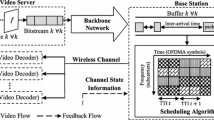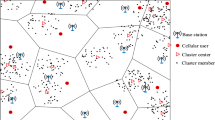Abstract
Uplink scheduling in wireless systems is gaining importance due to arising uplink intensive data services (ftp, image uploads etc.), which could be hampered by the currently in-built asymmetry in favor of the downlink. In this work, we propose and study algorithms for efficient uplink packet-data scheduling in a CDMA cell. The algorithms attempt to maximize system throughput under transmit power limitations on the mobiles assuming instantaneous knowledge of user queues and channels. However no channel statistics or traffic characterization is necessary. Apart from increasing throughput, the algorithms also improve fairness of service among users, hence reducing chances of buffer overflows for poorly located users.
The major observation arising from our analysis is that it is advantageous on the uplink to schedule “strong” users one-at-a-time, and “weak” users in larger groups. This contrasts with the downlink where one-at-a-time transmission for all users has shown to be the preferred mode in much previous work. Based on the optimal schedules, we propose less complex and more practical approximate methods, both of which offer significant performance improvement compared to one-at-a-time transmission, and the widely acclaimed Proportional Fair (PF) algorithm, in simulations. When queue content cannot be fed back, we propose a simple modification of PF, Uplink PF (UPF), that offers similar improvement.
Similar content being viewed by others
References
R. Agrawal and R. Leelahakriengkrai, Scheduling in multimedia DS-CDMA wireless networks, in: Proc. of INFORMS National Meeting (Oct. 1998).
D.M. Andrews, K. Kumaran, K. Ramanan, A. Stolyar, R. Vijayakumar and P. Whiting, CDMA data QoS scheduling on the forward link with variable channel conditions, Bell Labs Technical Memo No. 10009626-000404-05TM (2000).
P. Bender et al., CDMA/HDR a bandwidth efficient high speed wireless data service for nomadic users, IEEE Communications Magazine 38(7) (2000) 70–77.
E. Esteves, On the reverse link capacity of CDMA2000 high rate packet data systems, in: Proc. of ICC'02 (May 2002), vol. 3, pp. 1823–1828.
3GPP2 Standard: see http://www.3gpp2.org
S.V. Hanly, Information capacity of radio networks, Ph. D. Thesis, Cambridge University, England (1993).
S. Hanly and D. Tse, Multiaccess fading channels—Part II: Delay limited capacities, IEEE Transactions on Information Theory 44(7) (1998) 2816–2831.
A. Jalali, R. Padovani and R. Pankaj, Data throughput of CDMA-HDR a high efficiency-high data rate personal communication wireless system, in: Proc. of IEEE VTC'00 (2000) vol. 3, pp. 1854–1858.
R. Jäntti and Seong-Lyun Kim, Transmission rate scheduling for the non-real-time data in a cellular CDMA system, IEEE Communications Letters 5(5) (2001) 200–202.
N. Kahale and P.E. Wright, Dynamic global packet routing in wireless networks, in: Proc. of INFOCOM'97 (April 1997) vol. 3, pp. 1414–1421.
J. Luo, L. Lin, R. Yates and P. Spasojevic, Service outage based power and rate allocation, in: Proc. of CISS'01 (2001).
L. Qian, Optimal power control in cellular wireless systems, Ph.D. Thesis, Rutgers University, Piscataway, NJ (2001).
S. Ramakrishna, Optimal scheduling of CDMA systems, Ph.D. Thesis, WINLAB, Rutgers University, Piscataway, NJ (1996).
A. Sampath and J. Holtzman, Access control of data in integrated voice/data CDMA systems: Benefits and tradeoffs, IEEE Journal on Selected Areas in Communications 15(8) (1997) 1511–1526.
G. Stuber, Principles of Mobile Communication (2nd ed.), (Kluwer Academic Publishers, 2001).
C.W. Sung and W.S. Wong, Power control and rate management for wireless multimedia CDMA systems, IEEE Transactions on Communications 49(7) (2001) 1215–1226.
L. Tassiulas, Scheduling and performance limits of networks with constantly changing topology, IEEE transactions on information theory 43(3) (1997) 1067–1073.
L. Tassiulas and A. Ephremides, Stability properties of constrained queueing systems and scheduling for maximum throughput in multihop radio networks, IEEE Transactions on Automatic Control 37(12) (1992) 1936–1949.
S. Ulukus and L.J. Greenstein, Throughput maximization in CDMA uplinks using adaptive spreading and power control, in: Proc. of IEEE 6th Intl. Symposium on Spread-Spectrum Tech. and Appl. (Sep. 2000), vol. 2, pp. 565–569.
Author information
Authors and Affiliations
Corresponding author
Additional information
Hereafter, we refer to users with low recieved power at the base even when transmitting at peak transmit power as “weak” users, and the strongly recieved users at the base as “strong” users.
Krishnan Kumaran is currently a member of the Complex Systems Modeling section in the Corporate Strategic Research of ExxonMobil Corp., Clinton, NJ. Formerly, he was a Member of Technical Staff in the Mathematics of Networks and Systems Research Department at Bell Labs in Murray Hill, NJ, where his research interests were in modeling, analysis and simulation of design, resource management and scheduling issues in telecommunication networks.
Lijun Qian is an assistant professor in the Department of Electrical Engineering at Prairie View A&M University. He received his B.S. from Tsinghua University in Beijing, M.S. from Technion-Israel Institute of Technology, and Ph.D. from WINLAB, Rutgers University, all in electrical engineering. Before joining PVAMU, he was a researcher at Networks and Systems Research Department of Bell Labs in Murray Hill, NJ. His major research interests are in wireless communications and networking technologies, especially in radio resource management, protocol design, TCP/RLP optimization and MPLS traffic engineering.
Rights and permissions
About this article
Cite this article
Kumaran, K., Qian, L. Uplink Scheduling in CDMA Packet-Data Systems. Wireless Netw 12, 33–43 (2006). https://doi.org/10.1007/s11276-006-6148-7
Issue Date:
DOI: https://doi.org/10.1007/s11276-006-6148-7




